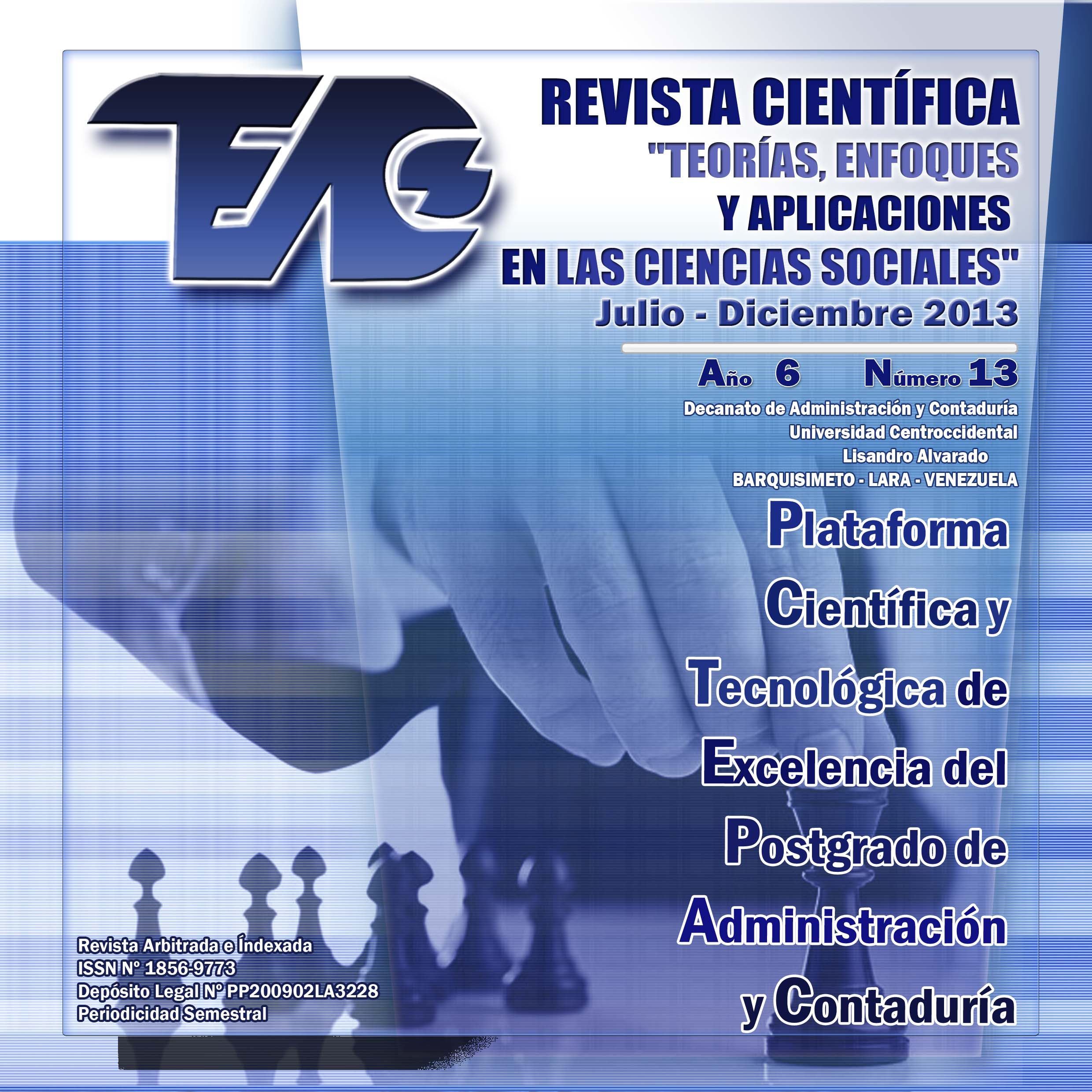The Organizational learning in the impress medium editor companies. Case: company "Al Dia Con La Noticia C.A"
Keywords:
knowledge management, organizational learning, human capitalAbstract
The research had as finalit, evaluate the "Al Dia Con La Noticia, C.A" company management model, under the theoretical lineaments of the Organizational Learning. The research done was of field, descriptive type and transversal and supported on documental sources. Because is a Case of Study type investigation, the population concept was represented for all the organization. To collect the information it was applied a questionnaire to twenty (20) key informants, and reinforced with the direct observation, in the same way was complemented the getting of information with the application of a semi structured interview, composed of six items were came out new questions in the course of the research dynamic. It was a quantitative investigation. The instruments were under subject by the expert's judgment. Concluding, can affirm that the company is qualify as a organization in learning process, which management process in the acknowledge management, still presents obstacles in its purpose of manage the organizational learning, which thanks to its human capital could achieve in relatively short terms.
Downloads
References
Argyris, Chris. y Schon. Donald A. (2005).Historia del Pensamiento Administrativo. Segunda Edición.
Bolívar, Antonio. (2000). Los centros educativos como organizaciones que aprenden. Promesas y realidades. Edit. Muralla. Madrid, España.
Bollinger, Audrey. & Smith, Robert. (2001). Managing Organizational Knowledge as a Strategic Asset. Journal of Knowledge Management, 5 (1), 8-18.
Cangelosi Vincent.. y Dill, William. R. (1965). Organizational Learning: Observations toward a Theory. [Documento en línea]. Disponible en:http://www.jstor.org/discover/10.2307/2391412?uid=3739296&uid=2&uid=4&sid=21101827990707. (Consulta: 2012, Febrero, 11).
Claver Cortes E. y Zaragoza Saez. (2007). La Dirección de Recursos Humanos en Organizaciones Inteligentes. Una Evidencia Empírica desde la dirección del Conocimiento. [Documento en línea] Disponible en:http://dialnet.unirioja.es/ descarga/artículo/2356653.pdf. (Consulta: Diciembre, 13, 2012).
Cyert, Richard. M. y March, James. G. (1963). A Behavioral theory of the firm.Englewood Cliffs, NJ: Prentice-Hall.
Johnson Ben. y Lundvall, Bjorn.A. (1994).Sistemas nacionales de innovación y aprendizaje institucional. Revista Iberoamericana de Ciencia Tecnología y Sociedad. [Documento en línea]. Disponible en: http://www.scielo.org.ar/scielo. php?script=sciarttext&pid=S1850-00132009000200002. (Consulta: Noviembre, 20 de 2012).
López, Carlos. (2002).Introducción al aprendizaje organizacional.[Documento en línea]. Disponible en:http://www.gestiopoles.com/clubemprendedor/. (Consulta: 2011, Septiembre, 20).
March, James. y Simon, Herbert. (1958).Primer on Decision Making: How Decision Happen. New York, NY: Free Press
Martínez F, Somohano, R. y Fernández, L. (2002). Gestión Estratégica del Conocimiento y Cuadro de Mando Integral. Universidad de Cantabria. España.
Monteferrante, P. y Malavé, J. (2004).¿Qué están haciendo las Gerencias de Recursos Humanos en Venezuela? Revista Debates IESA, v X, N° 1, 39-44. Caracas, Venezuela.
Nonaka, Ikujiro. yTakeuchi, Hirotaca. (1995). The Knowledge-Creating Company. Editorial Universidad de Oxford. [Traducción en línea].[Documento en línea]. Disponible en:http://www.oocities.org/es/domingosalcedovalladares/gercon/foro4/contenido. htm.(Consulta 2011, Septiembre 20).
North, Klaus. y Rivas Roque. (2008). Gestión del Conocimiento. Una guía práctica hacia la empresa inteligente. Librosen Red.
Polanyi, Karl. (1996). La Gran Transformación. Critica del Liberalismo Económico. Ediciones Endymión.Traducción: Julia Várela y Fernando Álvarez-Uría. Madrid, España.
Senge, Peter. (2005). La Quinta Disciplina. El Arte y la Práctica de la Organización Abierta al Aprendizaje. 1era. Edición. Editorial Gránica. México.
Taylor, Frederick. (1911). Los Principios de la Administración Científica. [Documento en línea]. Disponible en: http://www.netmba.com/mgmt/scientific/. (Consulta: 2011, Noviembre 18).
Universidad Centroccidental Lisandro Alvarado. (UCLA, 2011). Manual para la Elaboración del trabajo conducente al Grado Académico de Especialización, Maestría y Doctorado. Barquisimeto, Venezuela.
Published
How to Cite
Issue
Section
Derechos del/de autor/es a partir del año de publicación
Esta obra está bajo la licencia:
Creative Commons Reconocimiento-NoComercial-CompartirIgual 4.0 Internacional (CC BY-NC-SA 4.0)
Las opiniones expresadas por los autores no necesariamente reflejan la postura del editor de la publicación ni de la UCLA. Se autoriza la reproducción total o parcial de los textos aquí publicados, siempre y cuando se cite la fuente completa y la dirección electrónica de esta revista. Los autores(as) tienen el derecho de utilizar sus artículos para cualquier propósito siempre y cuando se realice sin fines de lucro. Los autores(as) pueden publicar en internet o cualquier otro medio la versión final aprobada de su trabajo, luego que esta ha sido publicada en esta revista.



